Skyworth Bundle
Who Really Owns Skyworth?
Navigating the complex world of consumer electronics requires understanding the companies behind the products. Knowing Skyworth SWOT Analysis is just the first step. But, who truly controls the strategic direction of a global player like Skyworth Group Limited? This exploration unveils the ownership structure, crucial for investors and strategists alike.
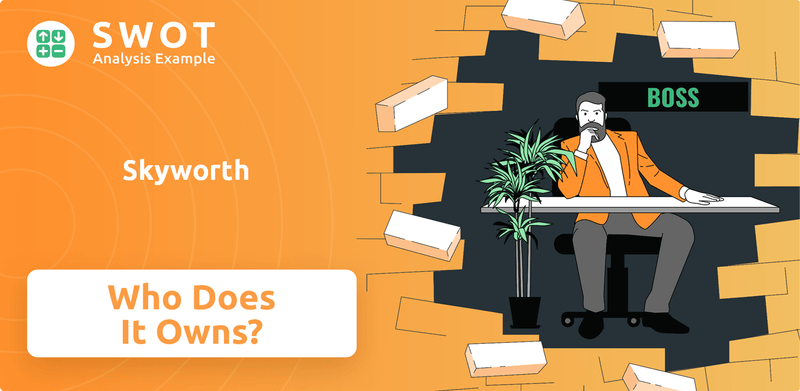
Founded in Shenzhen in 1988, Skyworth Company has evolved from a color television manufacturer to a diversified electronics giant. Understanding the evolution of Skyworth's ownership, from its founders to its current shareholders, is key to grasping its market position. This analysis will examine the key players and significant changes in the Skyworth ownership landscape, providing critical insights for anyone interested in Skyworth Electronics, its financial performance, or its future prospects.
Who Founded Skyworth?
The story of Skyworth begins in 1988, with Huang Hongsheng, also known as Stephen Wong, at the helm. He established the company in Shenzhen, China. Huang, born in 1956, had a background in electrical engineering, graduating in 1980 from South China University.
Initially, Huang faced challenges with his early venture, Skyworth Industrial, based in Hong Kong. However, he persevered and re-established the company as Skyworth Digital in Shenzhen. This marked a pivotal moment in the company's journey.
While the specific details of early ownership structures, such as equity splits or initial shareholding percentages, are not readily available, the company's rapid growth and eventual IPO on the Hong Kong Stock Exchange in April 2000 indicate a successful early phase. The founding team's vision was clear: to become a leading television manufacturer.
Huang Hongsheng founded the company in 1988.
The company initially faced challenges before finding success.
Skyworth went public on the Hong Kong Stock Exchange in April 2000.
The early focus was on becoming a leading television manufacturer.
Skyworth Industrial faced initial hurdles before re-establishment.
Huang Hongsheng's leadership was crucial in the early stages.
The early ownership of the Skyworth Group was centered around Huang Hongsheng, the founder. While specific details about the initial ownership structure are not available, the company's trajectory from its founding to its IPO in 2000 highlights a successful early phase. The company's early focus on television manufacturing set the stage for its future growth and diversification. To understand more about the company's strategic direction, you can read about the Growth Strategy of Skyworth.
Understanding the early ownership and founding of the Skyworth company provides context to its growth.
- Huang Hongsheng was the founder.
- The company went public in April 2000.
- Early focus was on television manufacturing.
- Early challenges were overcome to achieve success.
Skyworth SWOT Analysis
- Complete SWOT Breakdown
- Fully Customizable
- Editable in Excel & Word
- Professional Formatting
- Investor-Ready Format
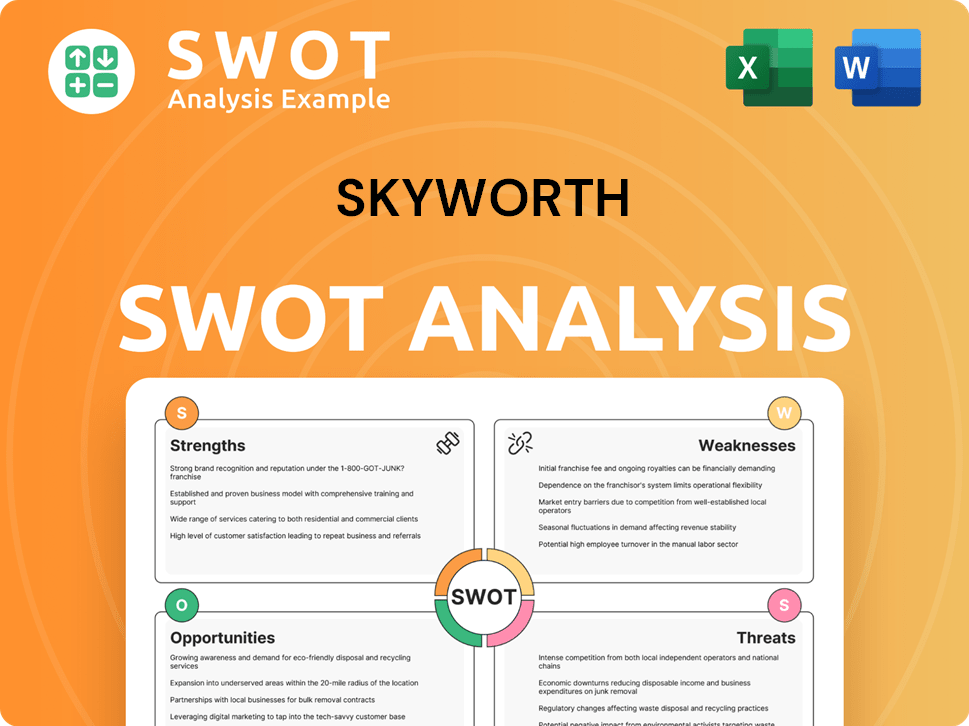
How Has Skyworth’s Ownership Changed Over Time?
The evolution of ownership for the Group has been marked by key events. The company's initial public offering (IPO) on the Hong Kong Stock Exchange in April 2000 was a pivotal moment, transforming it into a publicly traded entity. As of April 25, 2025, the share price was HKD 2.90, reflecting the market's valuation of the company. The market capitalization, a key indicator of the company's size and value, stood at approximately HKD 28.58 billion as of October 2023.
The transition to a public company structure introduced institutional and individual shareholders, altering the dynamics of ownership. This shift has influenced the company's strategy and governance, bringing in diverse perspectives and potentially driving performance improvements. The presence of major institutional investors often leads to increased scrutiny and expectations regarding financial and operational outcomes.
| Stakeholder | Shares Held | Percentage |
|---|---|---|
| Wang Wong (Founder) | 1,238,258,799 | 55.5% |
| Shi Chi (CEO and Executive Director) | 46,336,000 | 2.08% |
| The Vanguard Group, Inc. | 43,044,762 | 1.93% |
Currently, the major stakeholders of the Group include a mix of institutional investors and individual shareholders. As of April 25, 2025, there were 52 institutional owners and shareholders, collectively holding 114,364,668 shares. Key institutional shareholders include Vanguard Total International Stock Index Fund Investor Shares (VGTSX), iShares Core MSCI Emerging Markets ETF (IEMG), and Vanguard Emerging Markets Stock Index Fund Investor Shares (VEIEX). Founder Wang Wong holds a significant stake, with 55.5% of the shares, representing 1,238,258,799 shares. The CEO, Shi Chi, holds 2.08% of the shares. The Vanguard Group, Inc. holds 1.93% of the shares. BlackRock, Inc. is also a major shareholder. These ownership dynamics reflect the company's structure and its relationship with the investment community.
Understanding the ownership structure of the Group is crucial for investors and stakeholders. The company's IPO in 2000 marked a significant shift, with the founder retaining a controlling stake.
- The founder, Wang Wong, maintains a significant ownership percentage.
- Institutional investors like Vanguard and BlackRock hold notable positions.
- The presence of institutional investors can influence the company's strategy.
- The share price as of April 25, 2025, was HKD 2.90.
Skyworth PESTLE Analysis
- Covers All 6 PESTLE Categories
- No Research Needed – Save Hours of Work
- Built by Experts, Trusted by Consultants
- Instant Download, Ready to Use
- 100% Editable, Fully Customizable
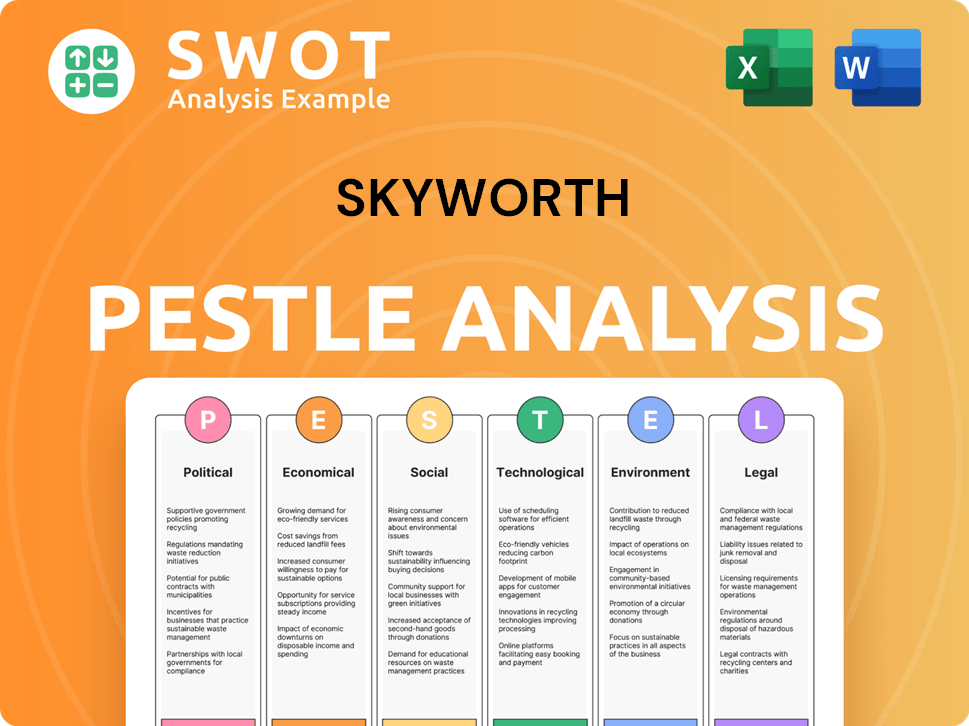
Who Sits on Skyworth’s Board?
As of March 24, 2025, the leadership of the Skyworth Group Limited is structured around a board of eight directors. This includes five executive directors who are actively involved in the company's operations, and three independent non-executive directors who provide oversight. Mr. Lin Jin chairs the board, while Mr. Shi Chi serves as the Chief Executive Officer.
The executive team also includes Ms. Lin Wei Ping, Mr. Wu Qinan (appointed from February 1, 2025), and Mr. Lam Shing Choi, Eric. The independent non-executive directors consist of Mr. Li Weibin, Mr. Cheong Ying Chew, Henry, and Mr. Hung Ka Hai, Clement. Mr. Shi Chi, the CEO, has a personal shareholding of 3.2% in Skyworth Digital, a subsidiary of the company. This structure helps in the management and strategic direction of the company, ensuring a balance between operational expertise and independent oversight. Understanding the Skyworth ownership structure is key to assessing the company's governance and strategic direction.
| Director | Title | Shareholding in Skyworth Digital (as of March 24, 2025) |
|---|---|---|
| Lin Jin | Chairman of the Board | N/A |
| Shi Chi | Chief Executive Officer | 3.2% |
| Lin Wei Ping | Executive Director | N/A |
| Wu Qinan | Executive Director | N/A |
| Lam Shing Choi, Eric | Executive Director | N/A |
| Li Weibin | Independent Non-Executive Director | N/A |
| Cheong Ying Chew, Henry | Independent Non-Executive Director | N/A |
| Hung Ka Hai, Clement | Independent Non-Executive Director | N/A |
The voting rights within Skyworth Group Limited appear to follow a standard one-share-one-vote system for general resolutions. This was confirmed by the results of the Annual General Meeting held on May 23, 2025, where resolutions, including the re-election of directors and the granting of general mandates for share issuance and repurchase, were approved by the shareholders. On the date of the AGM, the total number of issued shares that entitled shareholders to vote was 2,233,267,420. There is no indication of any special voting rights or founder shares that would give disproportionate control to specific individuals or entities. For more insights, you can explore the Brief History of Skyworth.
The Board of Directors at Skyworth Group is composed of executive and independent non-executive directors, ensuring a balance of operational expertise and oversight.
- The company operates under a one-share-one-vote principle, as demonstrated by the AGM results.
- The CEO, Mr. Shi Chi, holds a 3.2% stake in a subsidiary.
- Corporate governance is strengthened through committees focused on auditing, execution, nomination, and compensation.
- Understanding the Skyworth company ownership structure is essential for investors.
Skyworth Business Model Canvas
- Complete 9-Block Business Model Canvas
- Effortlessly Communicate Your Business Strategy
- Investor-Ready BMC Format
- 100% Editable and Customizable
- Clear and Structured Layout
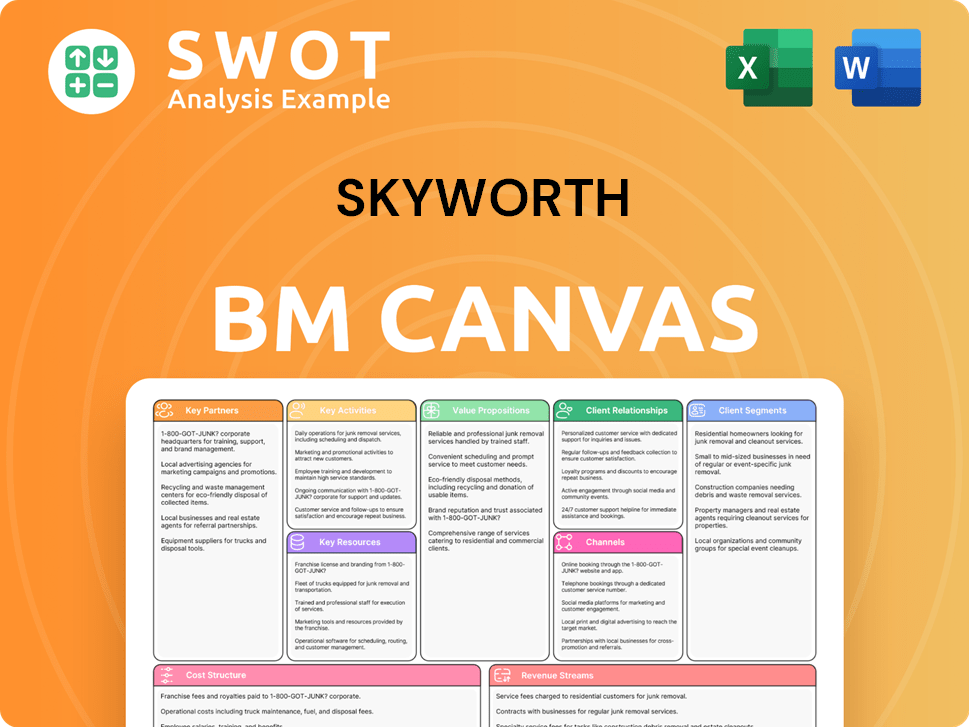
What Recent Changes Have Shaped Skyworth’s Ownership Landscape?
In the past few years, the ownership landscape of the Skyworth company has seen significant developments. A major move was the announcement of a share repurchase program on March 27, 2025. The company aimed to buy back up to 350,000,000 shares, representing 15.67% of its total issued share capital. The total buyback was for HKD 1,088.5 million at HKD 3.11 per share.
This share buyback program closed on June 6, 2025. A total of 341,262,688 shares were repurchased, accounting for 15.26% of the shares, for HKD 1,061.33 million. This action demonstrates a strategic effort to potentially boost shareholder value by reducing the number of outstanding shares. The company's focus on shareholder returns is evident through these capital management activities.
| Metric | Details | Date |
|---|---|---|
| Share Repurchase Program Announcement | Up to 350,000,000 shares | March 27, 2025 |
| Share Repurchase Price | HKD 3.11 per share | March 27, 2025 |
| Shares Repurchased | 341,262,688 shares | June 6, 2025 |
| Percentage of Shares Repurchased | 15.26% | June 6, 2025 |
| Total Repurchase Cost | HKD 1,061.33 million | June 6, 2025 |
Leadership changes and industry trends also influence the company's ownership profile. Mr. Wu Qinan was appointed as an Executive Director on February 1, 2025. Conversely, Vice Chairman Mr. Liu Tangzhi resigned on December 14, 2024. Institutional ownership is also increasing, with 52 institutional owners holding a significant number of shares as of April 25, 2025. These trends suggest a growing confidence in the company's long-term prospects.
The company initiated a share repurchase program to buy back a substantial number of shares. This action is a direct effort to increase shareholder value. The program closed in June 2025, with a significant number of shares repurchased.
There have been changes in the company's leadership team. These changes reflect the dynamic nature of corporate governance. Mr. Wu Qinan was appointed as an Executive Director.
Institutional investors hold a significant portion of shares. A growing number of institutional investors indicates confidence in the company. This trend often suggests a positive outlook for the company.
The share buyback program demonstrates active capital management. The company is focused on enhancing shareholder returns. These actions are part of the company's financial strategy.
Skyworth Porter's Five Forces Analysis
- Covers All 5 Competitive Forces in Detail
- Structured for Consultants, Students, and Founders
- 100% Editable in Microsoft Word & Excel
- Instant Digital Download – Use Immediately
- Compatible with Mac & PC – Fully Unlocked
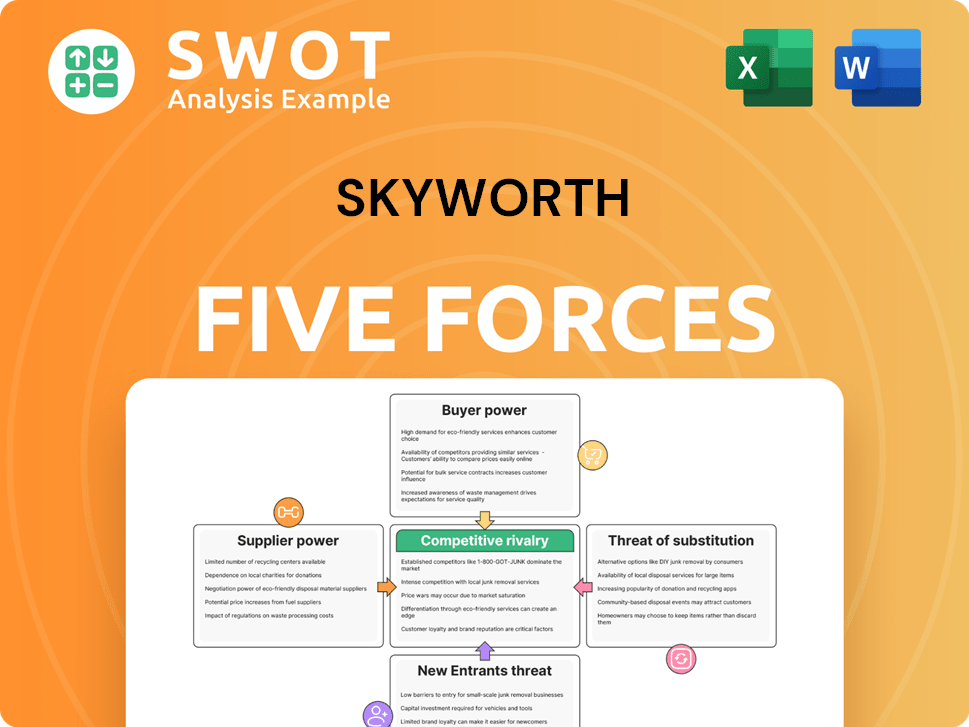
Related Blogs
- What are Mission Vision & Core Values of Skyworth Company?
- What is Competitive Landscape of Skyworth Company?
- What is Growth Strategy and Future Prospects of Skyworth Company?
- How Does Skyworth Company Work?
- What is Sales and Marketing Strategy of Skyworth Company?
- What is Brief History of Skyworth Company?
- What is Customer Demographics and Target Market of Skyworth Company?
Disclaimer
All information, articles, and product details provided on this website are for general informational and educational purposes only. We do not claim any ownership over, nor do we intend to infringe upon, any trademarks, copyrights, logos, brand names, or other intellectual property mentioned or depicted on this site. Such intellectual property remains the property of its respective owners, and any references here are made solely for identification or informational purposes, without implying any affiliation, endorsement, or partnership.
We make no representations or warranties, express or implied, regarding the accuracy, completeness, or suitability of any content or products presented. Nothing on this website should be construed as legal, tax, investment, financial, medical, or other professional advice. In addition, no part of this site—including articles or product references—constitutes a solicitation, recommendation, endorsement, advertisement, or offer to buy or sell any securities, franchises, or other financial instruments, particularly in jurisdictions where such activity would be unlawful.
All content is of a general nature and may not address the specific circumstances of any individual or entity. It is not a substitute for professional advice or services. Any actions you take based on the information provided here are strictly at your own risk. You accept full responsibility for any decisions or outcomes arising from your use of this website and agree to release us from any liability in connection with your use of, or reliance upon, the content or products found herein.